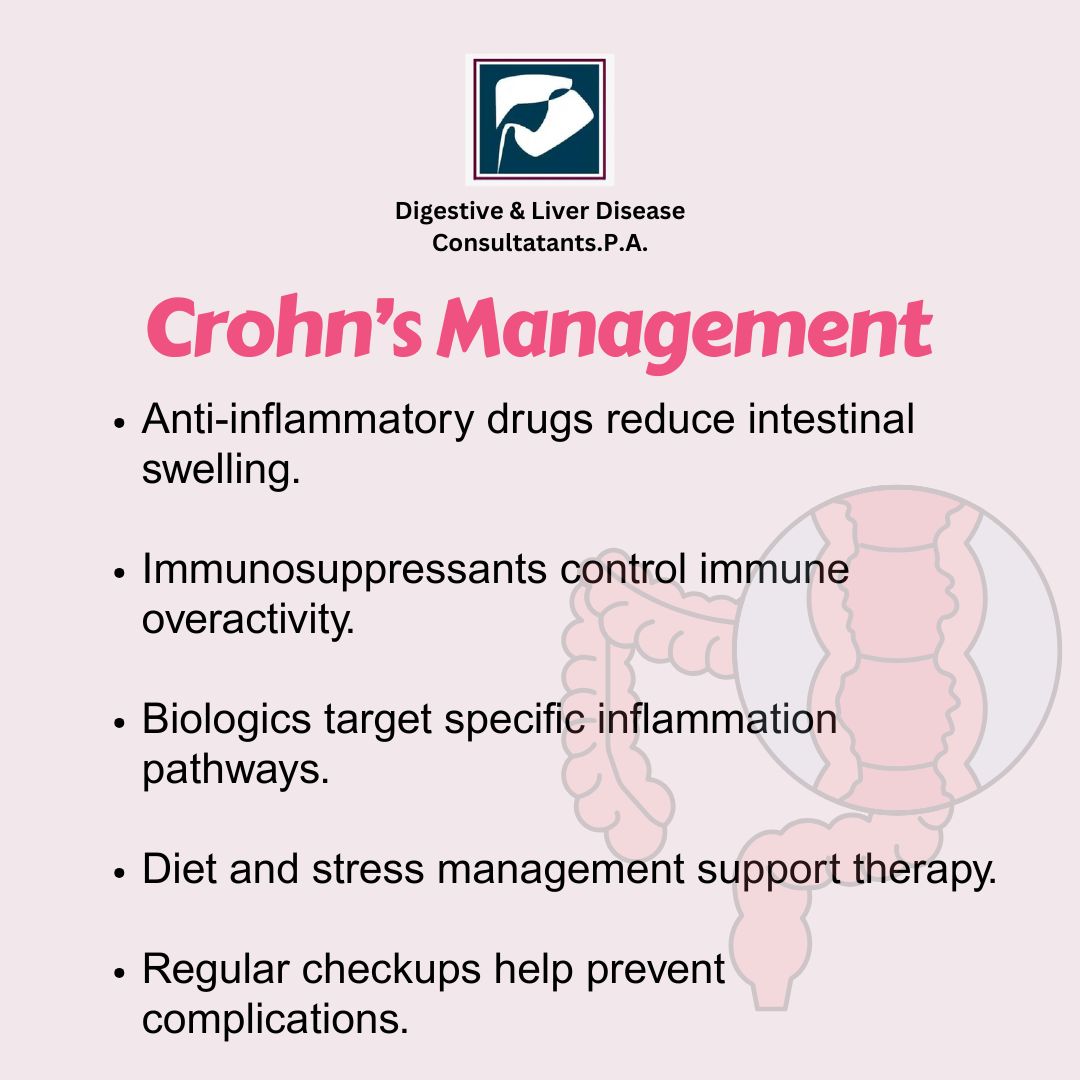Crohn’s disease is a chronic inflammatory condition that affects the digestive tract, causing symptoms like abdominal pain, diarrhea, weight loss, and fatigue. Managing Crohn’s disease effectively is crucial to improve quality of life and reduce complications. While there is no cure yet, medical therapy has made remarkable progress in helping patients control symptoms, achieve remission, and maintain long-term gut health.
At Digestive & Liver Disease Consultants, P.A., we understand the challenges faced by people with Crohn’s disease. Our experienced team specializes in advanced medical treatments tailored to each patient’s unique needs. This blog explains how medical therapy plays a vital role in managing Crohn’s disease and what treatment options are available today.
What Is Crohn’s Disease?
Crohn’s disease is a type of inflammatory bowel disease (IBD) that causes inflammation anywhere along the digestive tract, from the mouth to the anus. The inflammation can penetrate deep into the layers of the bowel, leading to symptoms such as:
- Persistent diarrhea
- Abdominal cramps and pain
- Blood in the stool
- Weight loss and malnutrition
- Fatigue and fever
Because Crohn’s disease is chronic and often unpredictable, treatment focuses on controlling inflammation, relieving symptoms, and preventing flare-ups or complications like strictures or fistulas.

Why Medical Therapy Is Key in Crohn’s Disease Management
Medical therapy aims to reduce intestinal inflammation and keep the disease in remission (a symptom-free state). Unlike surgery, which may be necessary in severe cases, medication helps manage the condition over the long term without invasive procedures.
The goals of medical treatment are:
- Achieve and maintain remission
- Heal the intestinal lining
- Improve quality of life
- Prevent complications such as bowel obstruction or infections
- Reduce the need for surgery or hospitalization
With the right medical therapy, many patients can live active, healthy lives with fewer symptoms and less disease progression.
Types of Medical Therapy for Crohn’s Disease
Medical therapy for Crohn’s disease includes a variety of drugs, each with a specific role. The choice of treatment depends on disease severity, location, patient’s overall health, and response to previous therapies.
1. Aminosalicylates (5-ASAs)
These medications, such as mesalamine, help reduce mild inflammation in the intestines. They are sometimes used in mild Crohn’s cases or to maintain remission but are less effective in severe disease.
2. Corticosteroids
Steroids like prednisone are powerful anti-inflammatory drugs that work quickly to control flare-ups. However, they are not suitable for long-term use due to side effects like weight gain, bone loss, and increased infection risk. Doctors usually prescribe steroids for short-term symptom relief.
3. Immunomodulators
These drugs, including azathioprine and methotrexate, suppress the immune system to reduce inflammation. They take longer to work (several weeks to months) but are useful for maintaining remission and reducing steroid dependence.
4. Biologic Therapies
Biologics are advanced medications made from living cells that target specific proteins involved in inflammation. They have revolutionized Crohn’s treatment and include drugs like infliximab, adalimumab, and ustekinumab.
Biologics are highly effective for moderate to severe Crohn’s disease and can promote healing of the bowel lining. They require regular injections or infusions and close monitoring.
5. Small Molecule Drugs
These newer oral medications, such as Janus kinase (JAK) inhibitors and S1P receptor modulators, target specific pathways in the immune system. They offer more options for patients who do not respond to traditional therapies.
Personalized Treatment Plans Are Essential
Crohn’s disease varies widely between individuals. Therefore, treatment plans are tailored based on:
- Disease severity and location
- Patient’s age and general health
- History of treatment response
- Presence of complications like strictures or fistulas
- Patient preferences and lifestyle
At Digestive & Liver Disease Consultants, P.A., our specialists use the latest diagnostic tools such as blood tests, stool analysis, endoscopy, and imaging studies to understand your disease thoroughly. This allows us to create a personalized medical therapy plan that maximizes benefits and minimizes side effects.
Supporting Medical Therapy with Lifestyle Changes
While medications are the foundation of Crohn’s disease management, lifestyle factors also play an important role. Patients are encouraged to:
- Follow a balanced, nutritious diet tailored to avoid triggers
- Stay hydrated and maintain a healthy weight
- Quit smoking, as it worsens Crohn’s disease
- Manage stress through relaxation techniques or counseling
- Keep up with regular medical check-ups and screenings
Together, medication and lifestyle adjustments provide a holistic approach that improves symptoms and promotes long-term gut health.
When Is Surgery Considered?
Although medical therapy helps most patients, some may need surgery to remove damaged sections of the intestine or manage complications such as strictures, fistulas, or abscesses. Surgery is usually considered when medications fail or in emergency situations.
Our expert team at Digestive & Liver Disease Consultants, P.A. works closely with colorectal surgeons to ensure seamless care and the best outcomes when surgery is necessary.
Why Choose Digestive & Liver Disease Consultants, P.A. for Crohn’s Disease?
At Digestive & Liver Disease Consultants, P.A., we are committed to providing compassionate, cutting-edge care for Crohn’s disease and other digestive disorders. Our strengths include:
- Experienced gastroenterologists specializing in IBD care
- Advanced diagnostic technologies for accurate assessment
- Comprehensive medical therapy tailored to each patient
- Access to the latest biologics and small molecule therapies
- Multidisciplinary support including dietitians, counselors, and surgeons
- Patient education and support to empower self-management
- Convenient in-person and telemedicine appointments
Our patient-centered approach ensures you get the right treatment at the right time, helping you live your life to the fullest despite Crohn’s disease.
Conclusion
Crohn’s disease is a lifelong condition, but with the right medical therapy, patients can control symptoms, reduce inflammation, and prevent complications. Advances in medications — from immunomodulators to biologics and new small molecules — have significantly improved outcomes for many people.
If you suffer from Crohn’s disease or digestive symptoms, don’t wait to seek expert care. Contact Digestive & Liver Disease Consultants, P.A.






